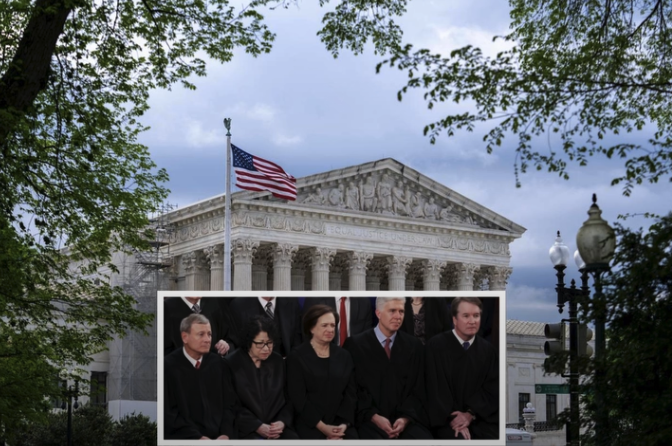Supreme Court Overturns Trump Administration’s Foreign Aid Freeze in 5-4 Decision — Deep Divisions Emerge Over Executive Power and Congressional Authority
In a narrowly divided 5-4 ruling on Wednesday, the U.S. Supreme Court rejected the Trump administration’s bid to keep billions of dollars in foreign aid — already approved by Congress — frozen. The decision marks a significant setback for the White House’s effort to exert tighter control over federal spending and signals potential challenges ahead for the administration’s broader agenda.
The unsigned order, which did not specify an immediate timeline for releasing the funds, leaves room for further legal wrangling in lower courts. The majority opinion comprised Chief Justice John Roberts, Justice Amy Coney Barrett, and the Court’s three liberal justices — Elena Kagan, Sonia Sotomayor, and Ketanji Brown Jackson. Dissenting were conservative Justices Samuel Alito, Clarence Thomas, Neil Gorsuch, and Brett Kavanaugh.
The majority emphasized that since a lower-court deadline for disbursing the funds had already lapsed, federal judges should “clarify what obligations the government must fulfill to ensure compliance with the temporary restraining order.”
Justice Alito issued a scathing dissent, expressing deep frustration with the ruling. “I am stunned by the Court’s decision to permit the lower-court judge to order the administration to unfreeze the foreign aid,” Alito wrote. “A federal court has many tools to address a party’s supposed nonfeasance. Self-aggrandizement of its jurisdiction is not one of them.”
Despite the sharp split, legal analysts characterized the ruling as procedurally limited. Georgetown Law professor and CNN Supreme Court analyst Steve Vladeck described it as “extremely modest,” noting that the Court’s unsigned order “does not actually require the Trump administration to immediately make up to $2 billion in foreign aid payments.” Instead, it allows lower courts to compel those payments if they provide greater specificity about which contracts must be honored.
Vladeck added that the vigorous dissent from four conservative justices “is a sign that the Court will likely remain divided, perhaps along these exact lines, in many of the more consequential Trump-related cases already on their way.”
The appeal reached the high court in record time — a matter of days — underscoring the urgency of the dispute. It marks the second major case this year to test the boundaries of President Trump’s executive authority as he continues his effort to consolidate control over the federal bureaucracy.
At the heart of the case lies billions of dollars in foreign aid managed by the State Department and the U.S. Agency for International Development (USAID). The Trump administration froze the funds in January as part of a broader initiative to realign government spending with the president’s policy priorities. Several nonprofit organizations that depend on the aid for global health, humanitarian, and development programs sued, arguing that the move usurped Congress’s constitutional power over appropriations and violated federal administrative law.
In a court filing, the groups described the freeze as “devastating,” emphasizing that the funding “advances U.S. interests abroad and improves — and, in many cases, literally saves — the lives of millions of people across the globe.” They further noted that such aid “helps prevent disease and instability overseas before they reach our shores.”
U.S. District Judge Amir Ali, a Biden appointee, had ordered the administration on February 13 to resume the flow of funds on a temporary basis while litigation proceeded. When the plaintiffs alleged that the administration ignored that directive, Ali issued a stronger order requiring full disbursement of the funds by midnight Wednesday.
In response, the Trump administration filed an emergency appeal with the Supreme Court, arguing that while it was making “substantial efforts” to process payments, it could not comply within the court’s tight deadline. The nonprofit plaintiffs rejected that defense, accusing political appointees of intentionally obstructing payments and claiming the government had taken “no meaningful steps” toward compliance.
Chief Justice Roberts briefly granted the administration an “administrative stay” — a procedural pause — to allow both sides to file additional arguments before the Court issued its ruling.
The plaintiffs include major advocacy organizations such as the AIDS Vaccine Advocacy Coalition, which promotes global HIV prevention efforts, and the Global Health Council, representing international health and humanitarian programs.
Court documents revealed that the Trump administration has already terminated more than 90% of USAID’s active foreign aid awards. Of nearly 5,800 programs previously funded, only about 500 were retained — valued collectively at roughly $57 billion. The State Department reported a similar trend, terminating approximately 4,100 projects while retaining 2,700.
The sweeping freeze has caused widespread disruption to international development and health initiatives, particularly those combating infectious diseases and humanitarian crises. Compounding the fallout, the administration has reportedly furloughed or dismissed a large portion of USAID’s workforce.
Democrats Celebrate the Ruling
On Capitol Hill, Democrats hailed the decision as a decisive affirmation of congressional spending authority.
“That money had already been appropriated, things were already in motion,” said Rep. Gregory Meeks (D-NY), the top Democrat on the House Foreign Affairs Committee. “The Supreme Court ruled the right way, and now the administration needs to unfreeze the funds so contractors and aid workers can continue their work.”
Rep. Pramila Jayapal (D-WA) called it “a very important ruling from a Trump-dominated court,” adding that it reinforces the constitutional principle that “Congress has the power to appropriate money, and people rely on that authorization for these programs. When you do the work, you should get paid.”
Still, Jayapal expressed skepticism about whether the administration would comply. “I’m not confident about anything,” she said, “but I hope the Trump administration will pay attention to the Supreme Court.”
The case is expected to continue winding through lower courts in the coming weeks, setting up what could become a landmark confrontation over the limits of presidential control in federal budgeting and foreign policy execution.

